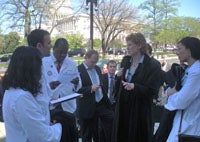Medical Students Advocate for Nutrition Education

Posted in GUMC Stories
 Recently, a cadre of short white coats went to Capitol Hill to support a proposed nutrition education amendment to the National School Lunch Act. These Georgetown medical students also want to help measure its effectiveness. Student Justin Beckett (M’14) offers this reflection on the visit.
Recently, a cadre of short white coats went to Capitol Hill to support a proposed nutrition education amendment to the National School Lunch Act. These Georgetown medical students also want to help measure its effectiveness. Student Justin Beckett (M’14) offers this reflection on the visit.
Partisanship aside, a recent afternoon trip to Capitol Hill was enough to prove that Americans feel strongly about their health care. On the Tuesday, March 27th, my colleagues, Lauren Thornton, Daniel Tupy, Willie Moore, Danielle Hoo-Fat, and I traveled to Capitol Hill to visit members of this U.S. House of Representatives, as part of Health Justice Week. My colleagues and I are part of a unique educational elective track, the Health Justice Scholars, at Georgetown University School of Medicine that instructs medical students on how to be physician-advocates. Combining guest speakers, political activism, service, and research, the Health Justice curriculum is an experiential learning process that prepares us to be active members of our profession and community.
As we arrived on Capitol Hill, we found ourselves surrounded by citizens exercising their right to free speech. At the U.S. Supreme Court, the constitutionality of the largest piece of health care legislation our generation has seen, the Affordable Care Act, was being debated. Outside the Court, citizens congregated to show both their support and disapproval of the Act in heated, yet peaceful demonstrations. Despite their profound differences in opinion, the ability of two ideologically opposed groups of individuals to occupy the same ground and carry on a dialogue on health care gave me a renewed sense of faith in this country’s ability to embrace progress and acknowledge the need for change. At the very least, it was evident that we could agree on the sacred nature of our health and well-being. Indeed, it seems the very issue that divides so many in our nation is the same issue that brings us together: a belief that health care is a fundamental part of life.
As we entered the U.S. House of Representatives wearing our white coats, we headed to the Office of U.S. Representative Eleanor Holmes Norton (D-D.C.). We were there to discuss an issue that my group is studying for our service and research project, in response to the epidemic of childhood obesity. We were there to show our support for H.R. 576, a bill introduced by U.S. Representative Joe Baca (D-Calif.) in February 2011 that proposes to amend the National School Lunch Act by requiring participating schools to establish in their local school wellness policies a provision that students receive 50 hours of nutrition education per school year. The bill outlines specific objectives for the nutritional education goals as well as requiring a means of assessment to ensure that students are learning.
My Health Justice group feels strongly about the importance of effective nutrition education in the public school system, and we are planning to focus on it in our research project. We hope to work with D.C. public schools in evaluating the effectiveness and impact on children of nutritional education interventions aimed at correcting knowledge, attitudes, and beliefs about food. Following an educational intervention, we also hope to study the effectiveness of exposing children to the nutritional content of school lunches to see if it impacts the decision making of their food choices. In generating data from our research, we hope to provide greater clarity for our legislators on the value of nutritional education in response to a nationwide epidemic.
Lobbying was quite the experience, and one I plan on continuing throughout my professional career. I am grateful that Georgetown affords its students time to be active citizens. In the midst of a contentious national debate on health care in this nation, it is comforting to know that our Congress is accessible and receptive to all of its constituents’ opinions on a realm of issues. As physicians in training, we bring a perspective and knowledge base that can serve as a resource to our Congressional representatives in developing effective legislation affecting our health. This experience reminded me of the responsibility that our profession carries not only in treating our patients, but also in educating and advocating on their behalf.
Indeed, our white coats serve many roles.
By Justin Beckett (M’14)
